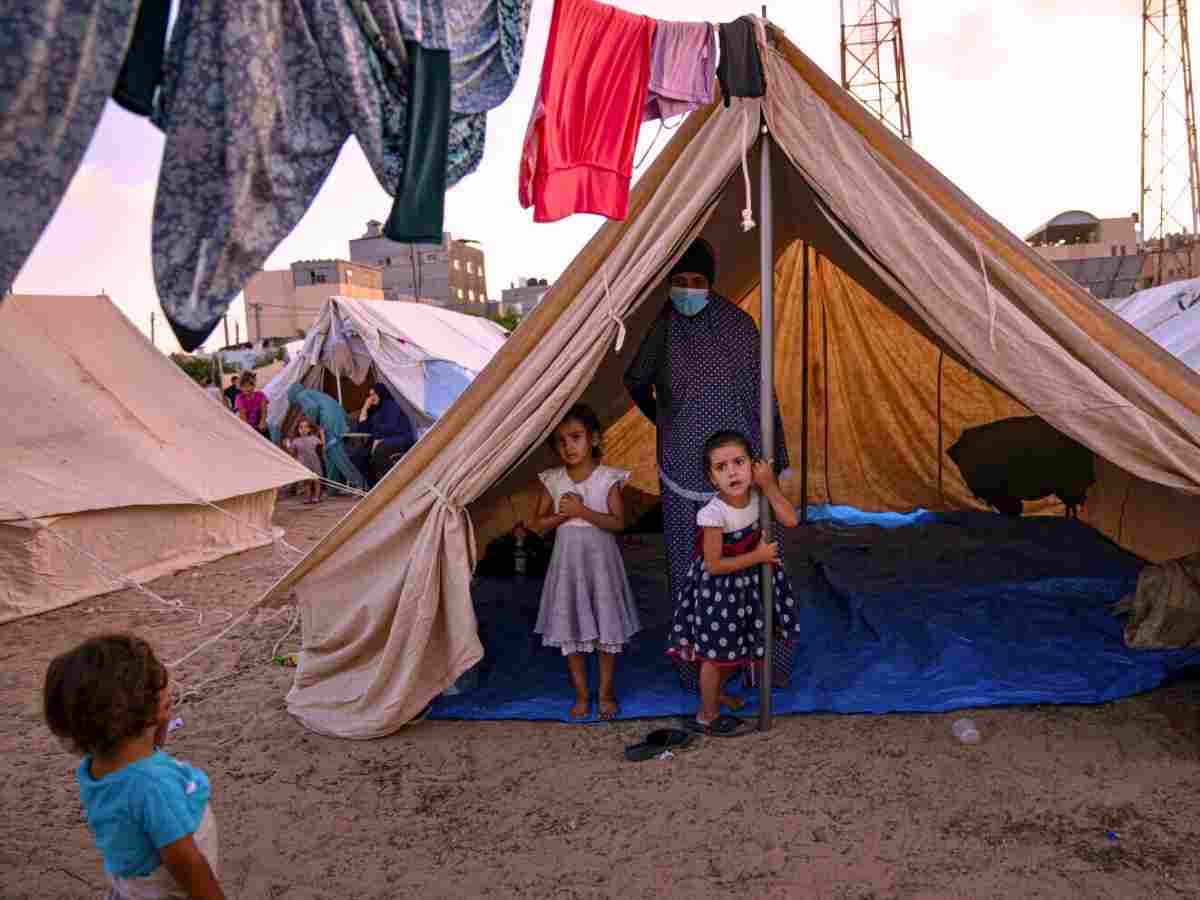In the Gaza Strip, tents for displaced persons turn into human ovens during the summer, with displaced families suffering from relentless heat and severe shortages of food and water amid Israel’s ongoing genocide.
More than 1.9 million people, or about 90% of the sector’s population, live in canvas tents that lack the basic necessities of life, which have reached tragic and suffocating conditions after they were forced to flee multiple times.
Displacement tents with heat that burns the body
The sun’s rays accumulate on the tents, turning them into human ovens that scorch children and older people alike. Older women bear a double burden: protecting their families and searching for basic necessities. Children wear heavy clothes unsuitable for summer, suffering under the heat of the sun, their skin showing signs of stress and deprivation.
Inside the tent, the smell of sweat mixes with dust and meager food. The floor is covered with dirt, and there is almost no ventilation. Water is almost non-existent, and the heat makes every movement inside the tent a struggle, whether to get water or to try to protect children from direct sunlight.
Women suffering from chronic diseases such as diabetes and high blood pressure find themselves unable to move easily, while men, mostly older ones, try to protect their families despite exhaustion and hunger. The small tents, which are no more than a few square meters in size, accommodate dozens of people, increasing the suffering and psychological and physical stress on all family members.
Life on the brink of collapse in Gaza
The daily reality of displaced people in tents can only be described as tragic. Children suffocate in the heat of the sun, suffer from hunger, and lack adequate clothing and blankets. Older people are physically breaking down, and women face double challenges: preparing meager meals, keeping children clean, and coping with the heat and hunger.
The night offers no respite either, as the cramped spaces inside the tents force families to sleep or sit in the open, with a continuing shortage of health and food supplies. The intense summer heat, combined with high humidity and restrictions on movement due to the war, make sleeping difficult and increase the suffering of older and disabled people, and children.
The UN report indicates that thousands of families have been displaced several times, losing any sense of security or stability. Heat, hunger, and disease have become part of their daily lives, while the disaster is exacerbated by the ongoing bombing and blockade imposed by the occupation on the Strip.
A never-ending humanitarian disaster
Since the beginning of the war, more than 62,000 people have been killed and more than 152,000 wounded by Israel, according to the Palestinian Ministry of Health. Thousands of children suffer from malnutrition and a severe shortage of water, food, shelter, and health care. The summer heat makes the tents unbearable to stay in, with women, children, and older people being the most affected.
International organizations such as UNICEF and the World Food Programme have repeatedly warned that time is running out for a humanitarian response and that the continuing crisis could lead to the worst-case scenario of famine, especially in Gaza City. Aid agencies report that thousands of families are no longer able to meet their daily needs and that most of the population is living on the brink of survival.
In every tent, the smell of hunger mixes with heat, sweat, and dust. Young children cry incessantly, women struggle to maintain any semblance of cleanliness, and men try to keep up the spirits of their families, but reality leaves no room for hope.
Scenes from a harsh daily life in Gaza
In the corners of the tents, children are scorched by heat that exceeds their physical capabilities, seeking shade under any piece of cloth or worn-out tent. Older people lean on the ground, barely able to move.
Water is very scarce, and food is almost non-existent, making life inside the tents a daily struggle for survival. The floors are covered with dust, and the heat makes them like ovens. The hot air burns both skin and clothes. The summer heat, hunger, and disease combine to make life inside the tents an unbearable daily challenge.
The small tents turn into human ovens, and the displaced people live in a daily struggle for survival, amid ongoing war, food and water shortages, and relentless heat. Every day that passes there is a battle for survival, and the lives of the displaced people in Gaza have become a stark example of human suffering in times of war.
Featured image via the Canary
